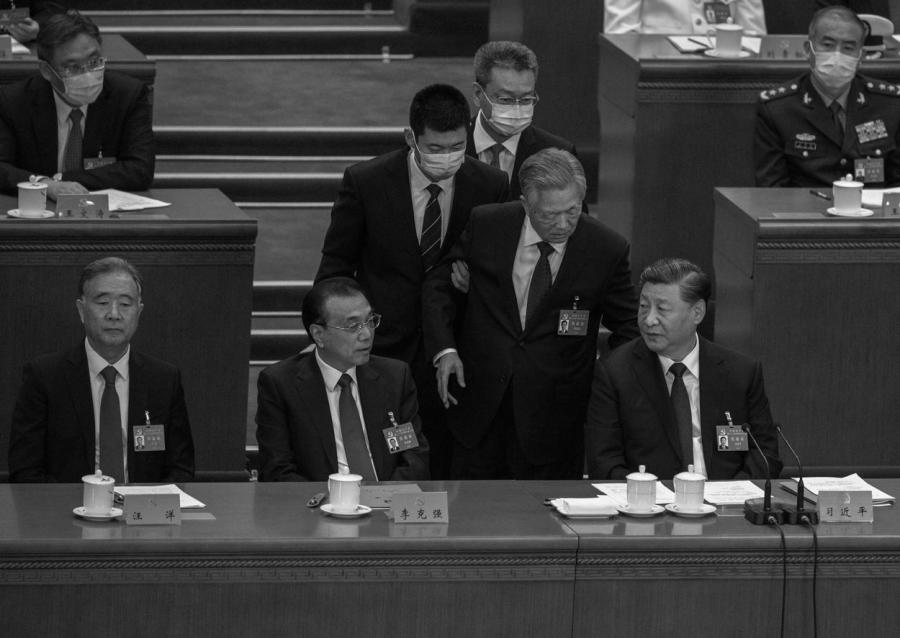On October 22, 2022, during the closing ceremony of the 20th National Congress of the Communist Party of China, Xi Jinping ordered the removal of former President Hu Jintao from the venue. (Photo by Kevin Frayer/Getty Images)
[People News] Over the past 13 years, Xi has personally promoted 79 generals. To date, this group has shown signs of what is termed "collapse-style corruption." Before the Fourth Plenary Session, a spokesperson for the Ministry of National Defence announced that 9 generals had been expelled from both the Party and the military. Prior to the investigation of these 9 generals, 5 others had already been investigated, all of whom were key figures in Xi's military, having been personally promoted and trusted by him. Among the 18 Central Committee members of the military who were absent from the Fourth Plenary Session but have not had their "double expulsion" announced, 14 are generals. In total, of the 79 generals promoted by Xi, an alarming 36 have been reported as under investigation or have encountered issues, which represents approximately 45.6%.
In recent years, the two most notable figures among the purged generals of the People's Liberation Army are He Weidong, a member of the Central Political Bureau and Vice Chairman of the Central Military Commission, and Miao Hua, a member of the Central Military Commission and former Director of the Political Work Department. Given the broad implications of their cases, they are key figures responsible for military unification, yet the underlying truth remains elusive.
According to a report from Newtalk News, Akio Yabuki, the executive director of the Indo-Pacific Strategic Think Tank, referenced comments made by former Central Party School professor Cai Xia during his program 'Akio Yabuki Newtalk'. He pointed out that Miao Hua, He Weidong, and others are suspected of trying to form a deputy military-level force that operates 'independently of the Central Military Commission', akin to the Iranian Revolutionary Guard or the Nazi Stormtroopers. 'This reflects an expansion of ambition within the military, and even a tendency to disregard commands.'
In his analysis, Akio Yabuki noted that while the truth is hard to verify, the scale of the recent rectification actions suggests that the 'Miao Hua group' may have strayed from Xi Jinping's control, which is the real catalyst for this crackdown. Within the People's Liberation Army, there has been a long-standing practice of using military exercises for promotions and resource control, leading to the emergence of various factions. 'These individuals are like cancer cells, continuously expanding their influence.'
Yabuki also mentioned another perspective that suggests 'generals are hesitant to engage in battle'. This primarily refers to Xi Jinping's unwavering determination to attack Taiwan, as he has reinstated generals from the Fujian faction and ordered the Rocket Force and frontline troops to 'prepare for the first strike against Taiwan'. However, these individuals initially sought advancement and wealth through military exercises, and when faced with actual combat, they tend to back down. Xi Jinping reportedly expressed his frustration: 'Train soldiers for a thousand days, use them for a moment', leading to the complete removal of this group.
The program also addressed the question of how stable Xi Jinping's lifelong leadership system is.
Recently, at the APEC summit, Xi Jinping engaged with leaders from various countries, believing that by making a public appearance on the international stage, he could alleviate external concerns regarding the stability of his power. Central Military Commission Vice Chairman Zhang Youxia also did not display any unusual behaviour.
In this context, international political scholar Cheng Xiaonong has pointed out that Xi Jinping's 'lifetime system' is heavily dependent on the extreme surveillance imposed by the Chinese Communist Party (CCP) on high-ranking officials above the level of Politburo members, making it nearly impossible for even retired elders and the deceased to escape this control.
Cheng Xiaonong highlighted that the freedom of action for CCP officials has been entirely stripped away, with most of them 'working from home' and submitting their daily tasks through written reports. Their residences are guarded, preventing outsiders from entering, while personal bodyguards, armed under the guise of 'protection,' are actually monitoring and reporting on them. Freedom of speech is virtually non-existent, as 'it is impossible to have even three private conversations.' From their time in office to retirement and even after death, they remain under constant surveillance.
Cheng Xiaonong further revealed the troubling aspects of the 'healthcare system': the Central Office's Health Bureau manages high-level medical care, prescribing medications and diagnosing illnesses without informing the individuals about their conditions. If the top leader orders confidentiality, patients are left completely unaware of their own health issues, turning their illnesses into instruments of control.
Moreover, the 'classified communication' system establishes a closed surveillance network. Ordinary correspondence between high-ranking officials cannot be sent through the postal service, isolating them in an atmosphere of distrust and fear. Cheng Xiaonong emphasised that these mechanisms ensure that there are no cracks in the core of power, thereby supporting Xi Jinping's prolonged rule. △











News magazine bootstrap themes!
I like this themes, fast loading and look profesional
Thank you Carlos!
You're welcome!
Please support me with give positive rating!
Yes Sure!